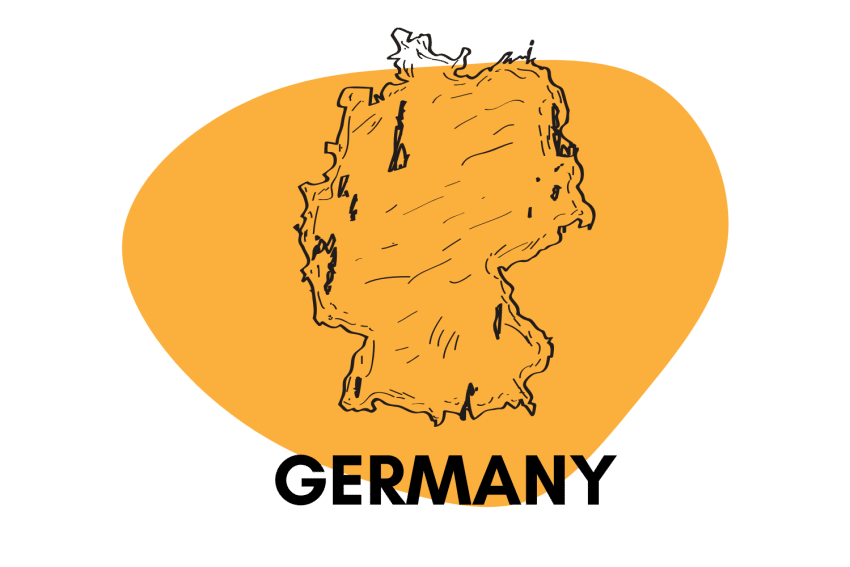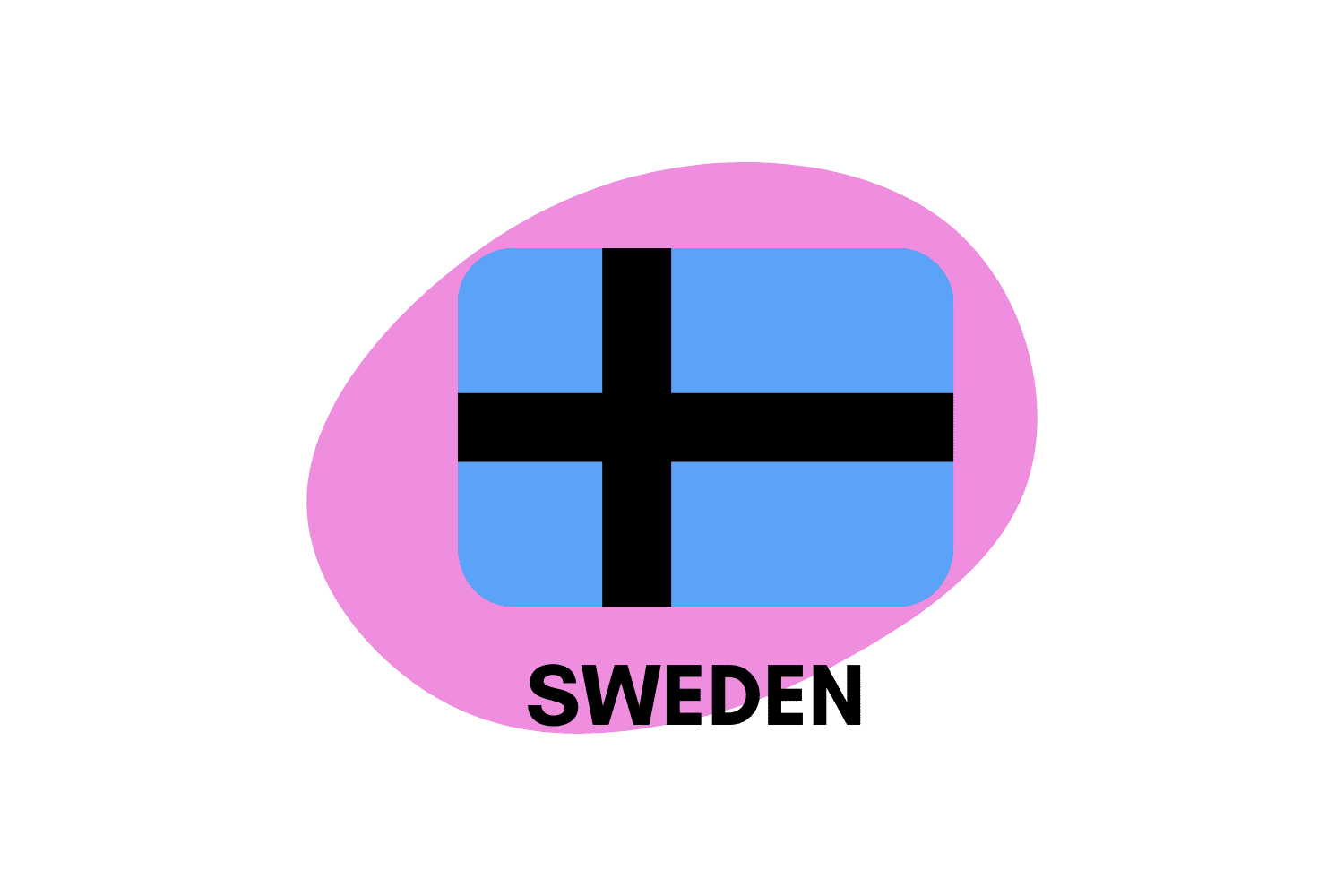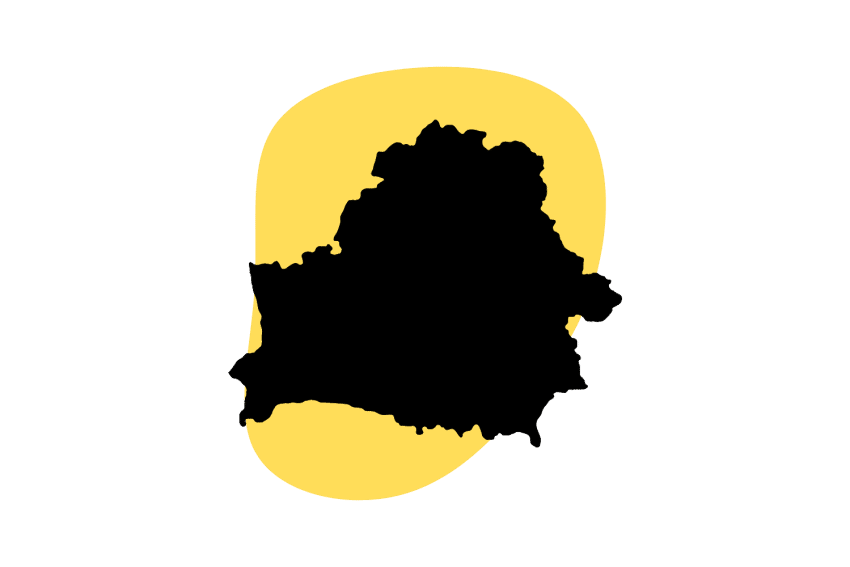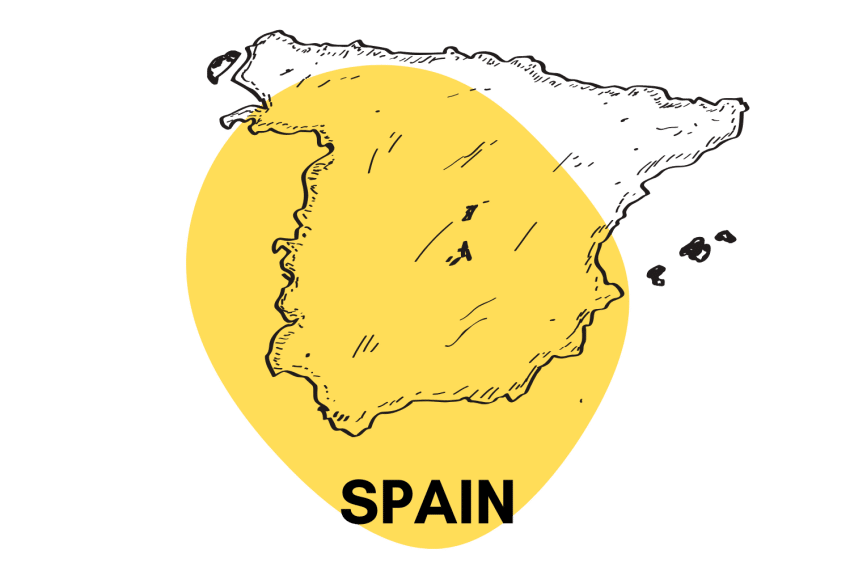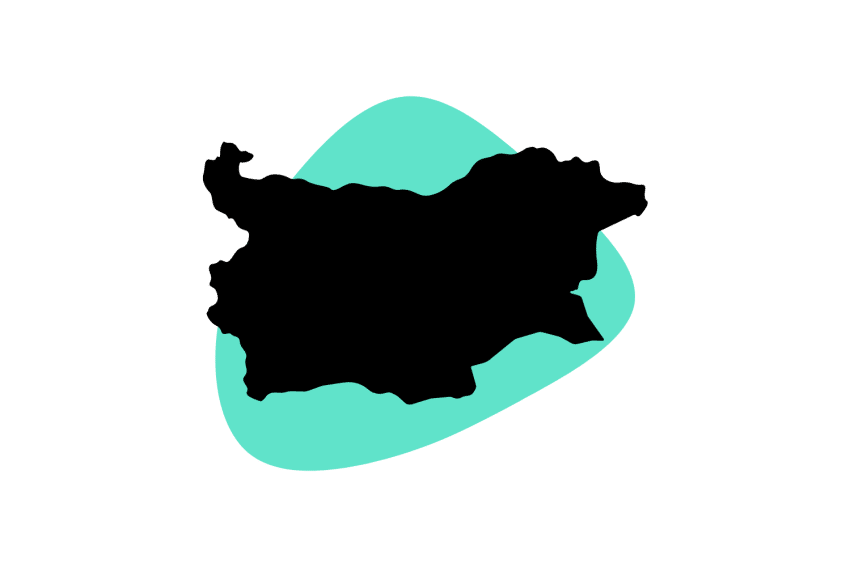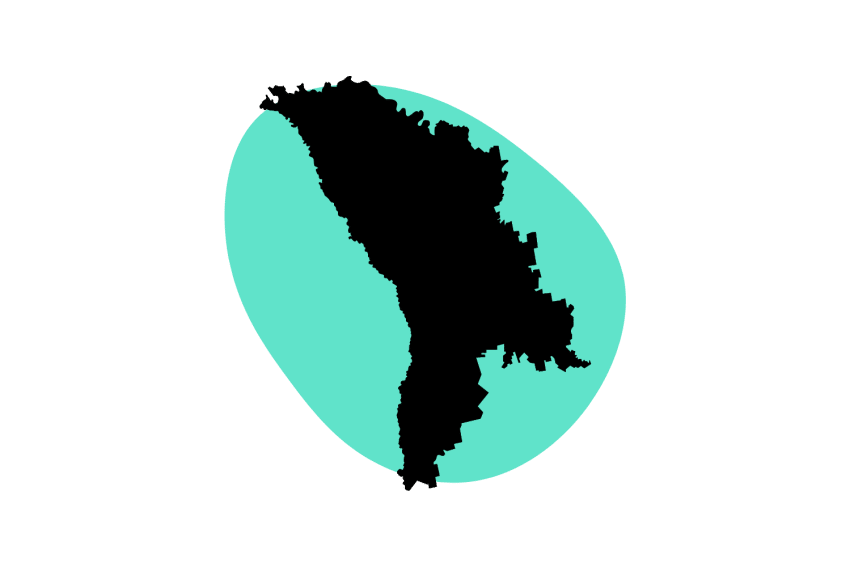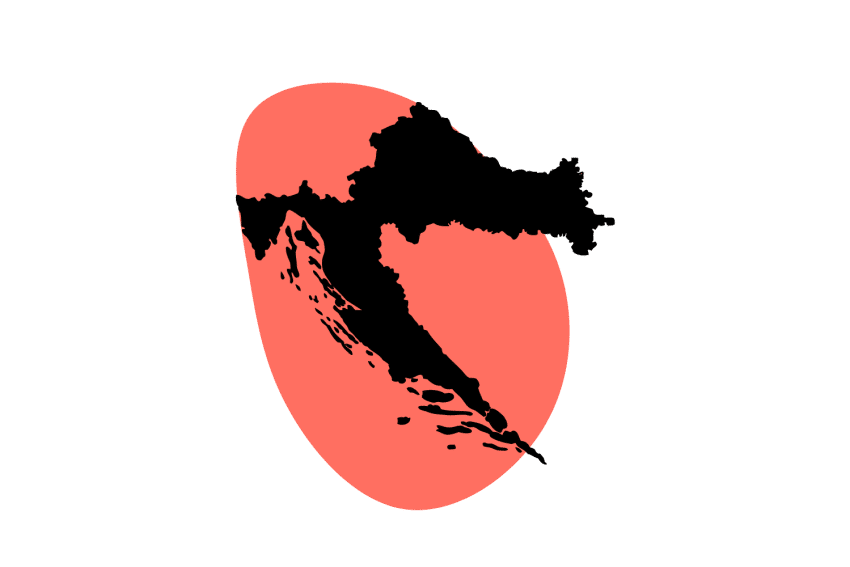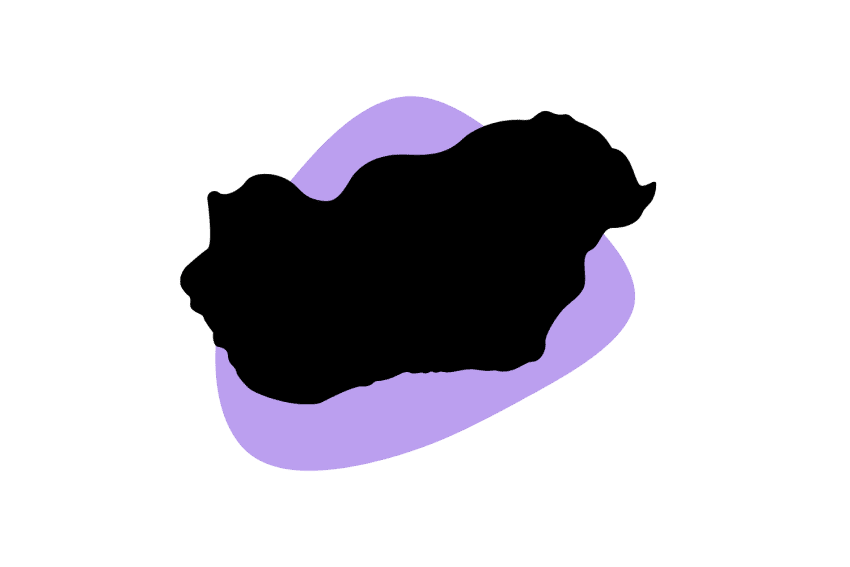Psychedelics In Albania: Will the Laws Change Soon?
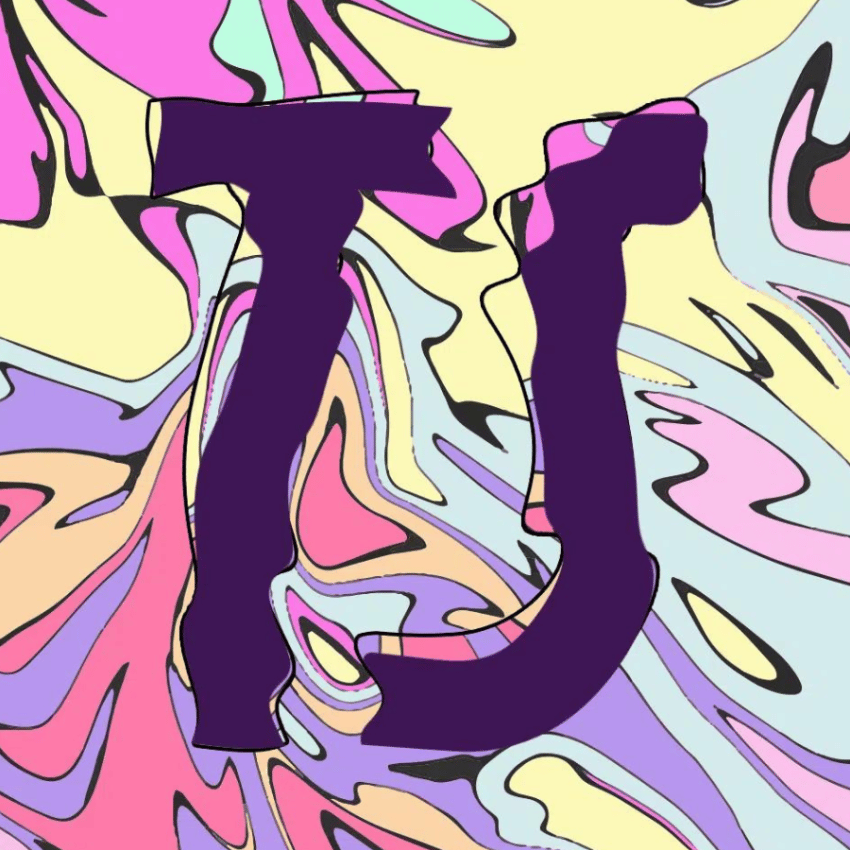
Albania has sturdy drug laws — all forms of psychedelics are strictly illegal under Albanian law.
The country also doesn’t allow the use of cannabis for medical purposes or hemp cultivation for industrial purposes. The law does distinguish between possession for trafficking and possession for personal use, but there are a lot of undefined details.
Will psychedelics ever be legalized in Albania? Possibly. But it’s not likely to happen anytime in the near future.
Summary of Psychedelic Drug Laws In Albania
- Psychedelics are illegal in Albania.
- Possession of small amounts for personal use (likely a single dose) is not punishable.
- Producing and distributing illicit drugs is punishable by five to ten years imprisonment.
- Repeated offenses are punishable by imprisonment of five to ten years. Unauthorized cultivation of narcotic plants is punishable by imprisonment of three to seven years.
- Both marijuana and hemp are illegal for industrial, recreational, and medicinal use.
- A few magic mushroom species grow wild in Albania, including Psilocybe serbica, Psilocybe semilanceata, and Amanita muscaria.
| Psychedelic | Legal Status | Punishment |
| Magic Mushrooms | Prohibited | Possession for personal use of small amounts (likely a single dose) is not punishable. |
| LSD | Prohibited | Possession for personal use of small amounts (likely a single dose) is not punishable. |
| DMT | Prohibited | Possession for personal use of small amounts (likely a single dose) is not punishable. |
| MDMA | Prohibited | Possession for personal use of small amounts (likely a single dose) is not punishable. |
| Ketamine | Prohibited | Possession for personal use of small amounts (likely a single dose) is not punishable. |
| Marijuana | Prohibited | Possession for personal use of small amounts (likely a single dose) is not punishable. |
Are Magic Mushrooms Legal In Albania?
No, magic mushrooms are illegal in Albania.
Psilocybin and psilocin, the most prevalent naturally occurring psychedelic chemicals in magic mushrooms, are Schedule I Substances under the Albanian Act on Narcotic Drugs and Psychotropic Substances (1995).
Possessing small amounts of magic mushrooms for one-time, personal use is not punishable in this country (Criminal Code, Article 283).
The amount found in possession depends on each case, but the High Court ruled in 2008 that a small quantity (1.9 g) for the individual (heroin user) was a single dose. So, anything above a single dose might be considered illegal, and the person might be charged with trafficking.
The Albanian Criminal Code punishes the unauthorized production, sale, and distribution of psychotropic substances with five to ten years of prison (Article 283).
Although psilocybin is illegal in most of the world, it has a low risk of abuse and harm. Recently, scientists have discovered that this substance has potential mental health benefits. In fact, John Hopkins Medicine recommends re-classifying psilocybin as a Schedule IV substance so it can be prescribed by doctors.
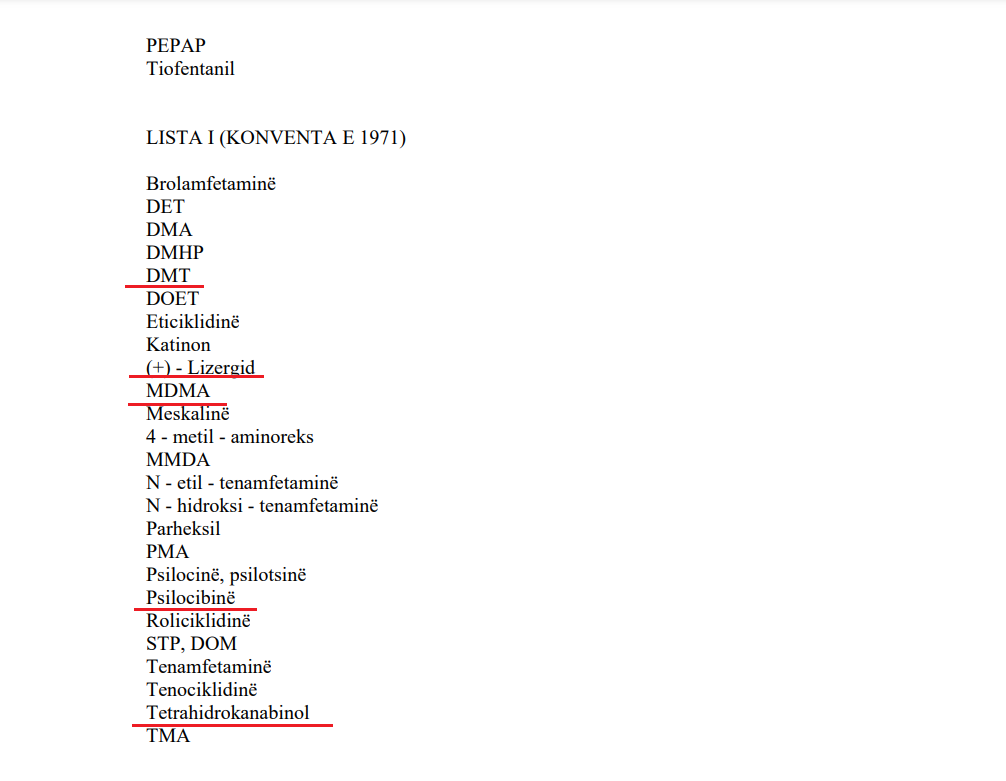
Pic. 1: DMT, MDMA, LSD, THC, and psilocybin are Schedule I substances in Albania as per the Convention on Psychotropic Substances of 1971.
Where to Buy Magic Mushroom Spores In Albania?
Avoid buying magic mushroom spores in Albania.
Under Article 284 of the Albanian Criminal Code, the unauthorized cultivation and keeping of plants to create a psychotropic substance can be punished with three to seven years in prison.
Magic mushroom spores don’t contain the illicit substance psilocybin, but cultivating the spores is illegal since they become hallucinogenic mushrooms rich in psilocybin.
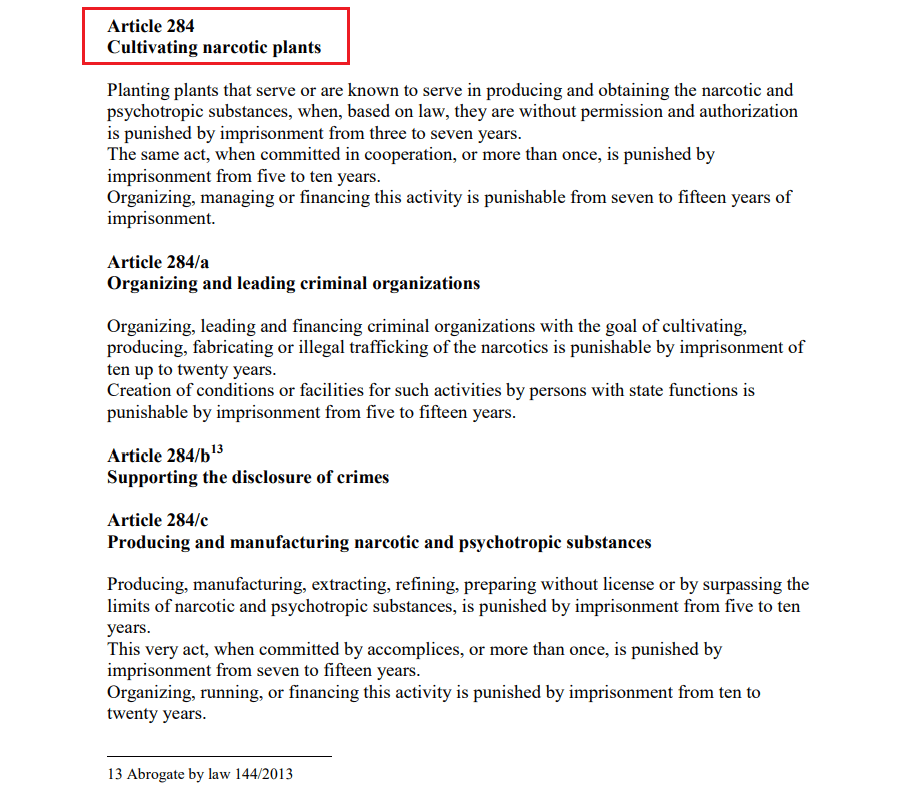
Pic. 2: Cultivation of plants that contain psychotropic substances is prohibited in Albania and punishable by imprisonment from three to seven years.
Do Magic Mushrooms Grow Wild In Albania?
There isn’t much information about the exact magic mushroom species that grow wild in Albania, but plenty of psilocybe species unofficially grow here, including the following:
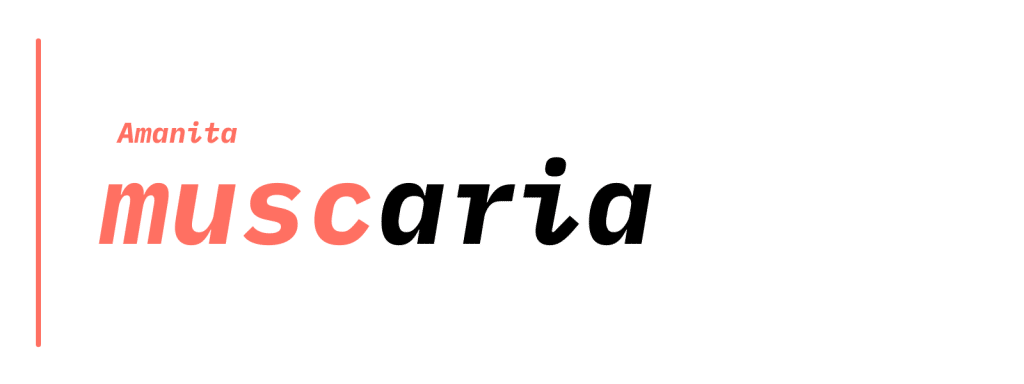
Amanita muscaria
Amanita muscaria, or the Fly agaric, is a striking toadstool species with a (typically) red, white-spotted cap.
This colorful cosmopolitan mushroom grows in conifer and deciduous woodlands and forms symbiosis with pine, oak, birch, and cedar trees. It’s unique because it doesn’t contain psilocybin — its hallucinogenic properties come from muscimol.
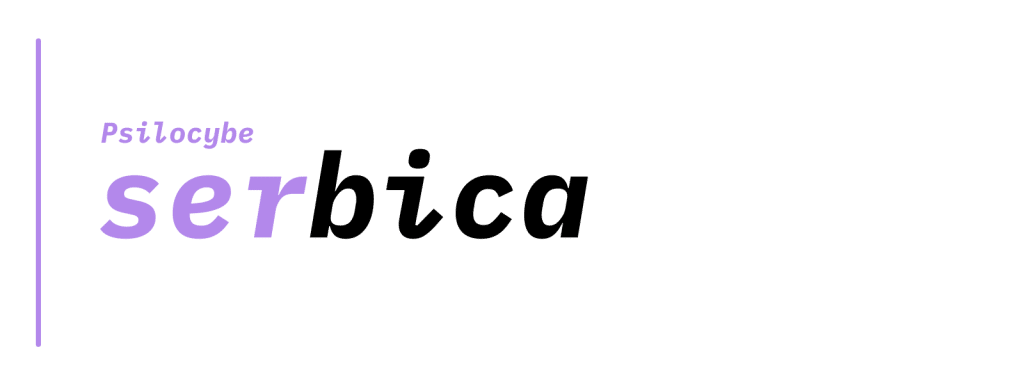
Psilocybe serbica
Psilocybe serbica is rich in psilocybin, psilocin, and baeocystinis and is one of the most common hallucinogenic mushrooms in the Balkan area. It grows in groups on rotten deciduous and coniferous wood, twigs, plant residue, and along Urtica spp. (Nettles) or rubus spp. (the raspberry family).
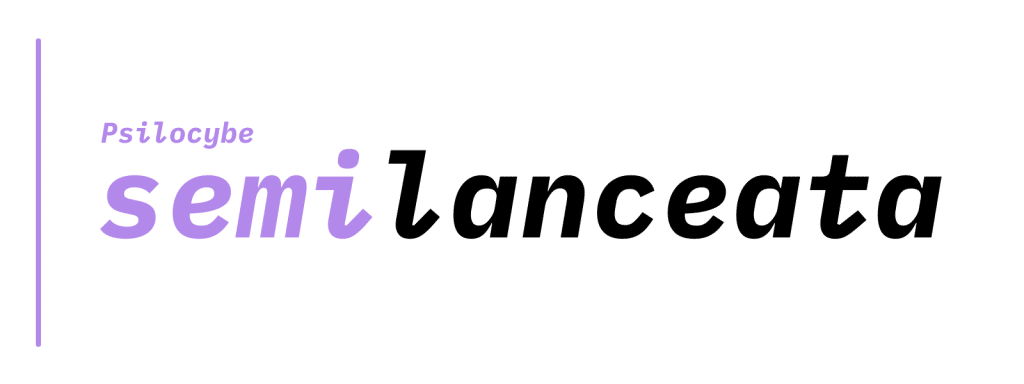
Psilocybe semilanceata
Psilocybe semilanceata is also rich in the hallucinogenic compounds psilocybin, psilocin, and baeocystin. This magic mushroom has an interesting yellow to brown bell-shaped cap and loves wetter areas and grasslands. P. semilanceata is saprobic, meaning it feeds off decaying grass roots.
Related: Where Do Shrooms Grow? How to Find Magic Mushrooms In the Wild
Is LSD Legal In Albania?
No, LSD (lysergic acid diethylamide) is an illegal substance in Albania.
LSD is a Schedule I Controlled Substance under the Albanian Act on Narcotic Drugs and Psychotropic Substances (1995).
Simple possession of LSD for personal use is not punishable here, but distributing and manufacturing it can get you five to ten years in prison. (Criminal Code, Article 283).
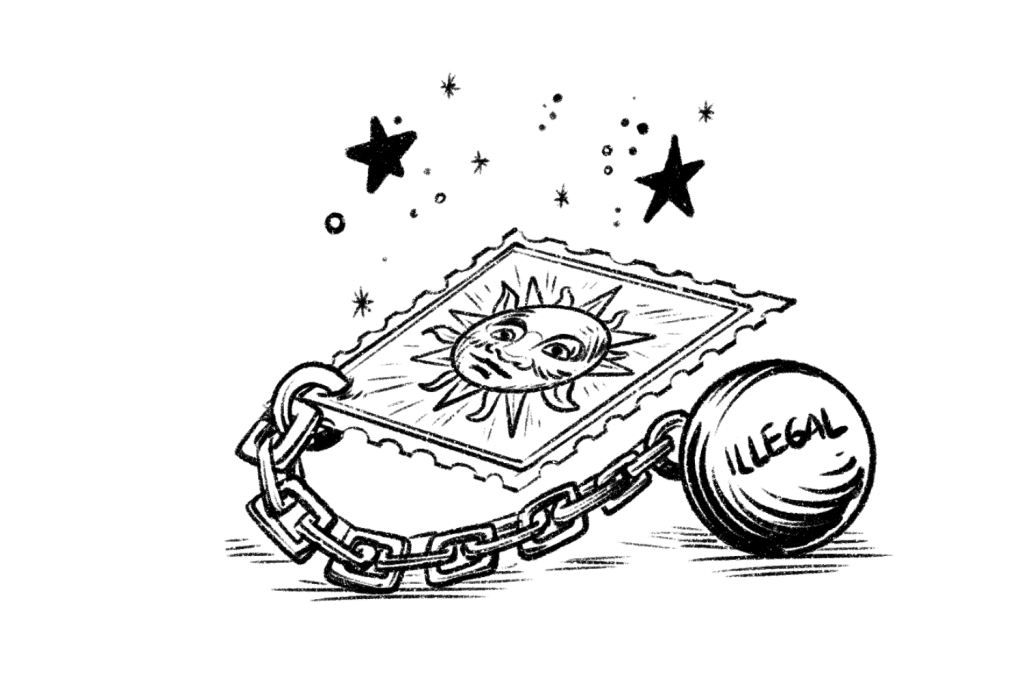
Is DMT Legal In Albania?
No, DMT (dimethyltryptamine) is illegal in Albania.
DMT is a Schedule I Controlled Substance under the Albanian Act on Narcotic Drugs and Psychotropic Substances (1995).
Possessing small amounts of DMT for personal use is not punishable in Albania, but producing, selling, and distributing it can be punished with five to ten years in prison, according to Article 283 of the Albanian Criminal Code.
A wide range of herbs — and the human brain — produce DMT, one of the most potent hallucinogenic compounds on earth. Certain cultures use it, often as ayahuasca, a bitter-tasting brew, or its smokable form, changa.
Is MDMA Legal In Albania?
No, MDMA is an illegal substance in Albania.
MDMA is a Schedule I Controlled Substance under the Albanian Act on Narcotic Drugs and Psychotropic Substances (1995), right alongside LSD and shrooms.
The Albanian Criminal Code punishes the unlawful manufacture, distribution, and sale of MDMA by imprisonment from five to ten years (Article 283). Repeated offenses are punishable by imprisonment from seven to fifteen years, while organizing and managing are sanctioned by ten to twenty years of prison.
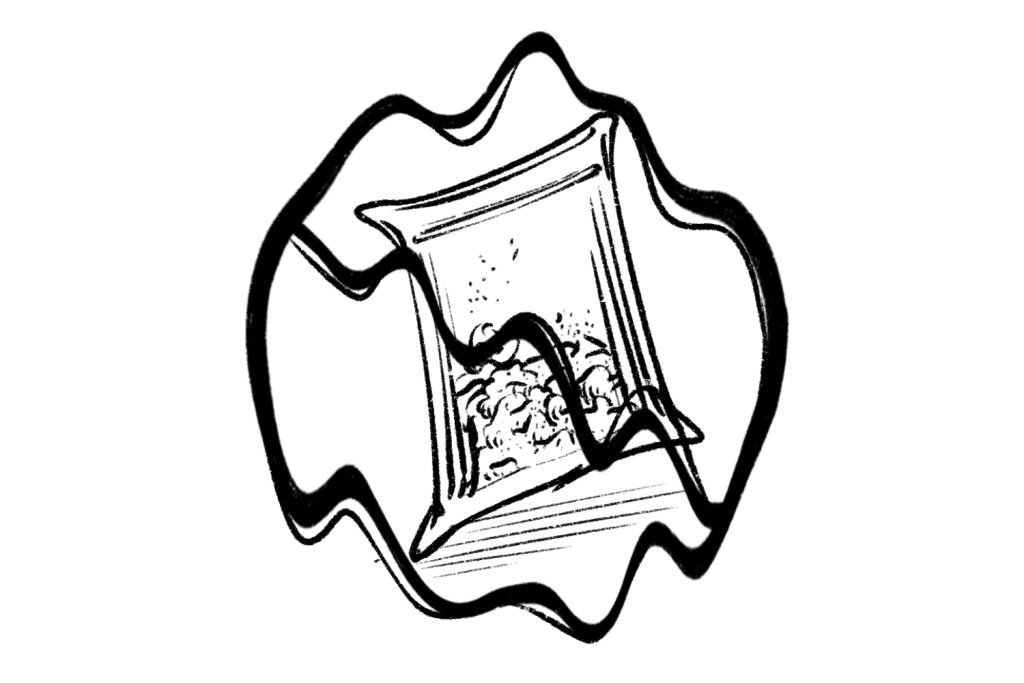
Possessing small amounts of MDMA is decriminalized and not punishable. There’s no standardized amount, but according to a 2008 High Court ruling, a small amount equals a single dose. (Article 283, Criminal Code).
MDMA is another substance under research for mental health or psychedelic-assisted psychotherapy. Although some countries have moved towards legalizing it for mental health, that’s unlikely to happen in Albania anytime soon.
Is Ketamine Legal In Albania?
No, ketamine is illegal in Albania.
The country’s list of controlled substances doesn’t directly mention ketamine, but because of its medical uses and the country’s strict drug laws, it’s likely illegal.
Ketamine is an anesthetic commonly used in veterinary medicine, but some U.S. states have legalized it as a therapy for treatment-resistant depression and PTSD.
However, this drug is not permitted for mental health or other use outside medical settings in Albania.
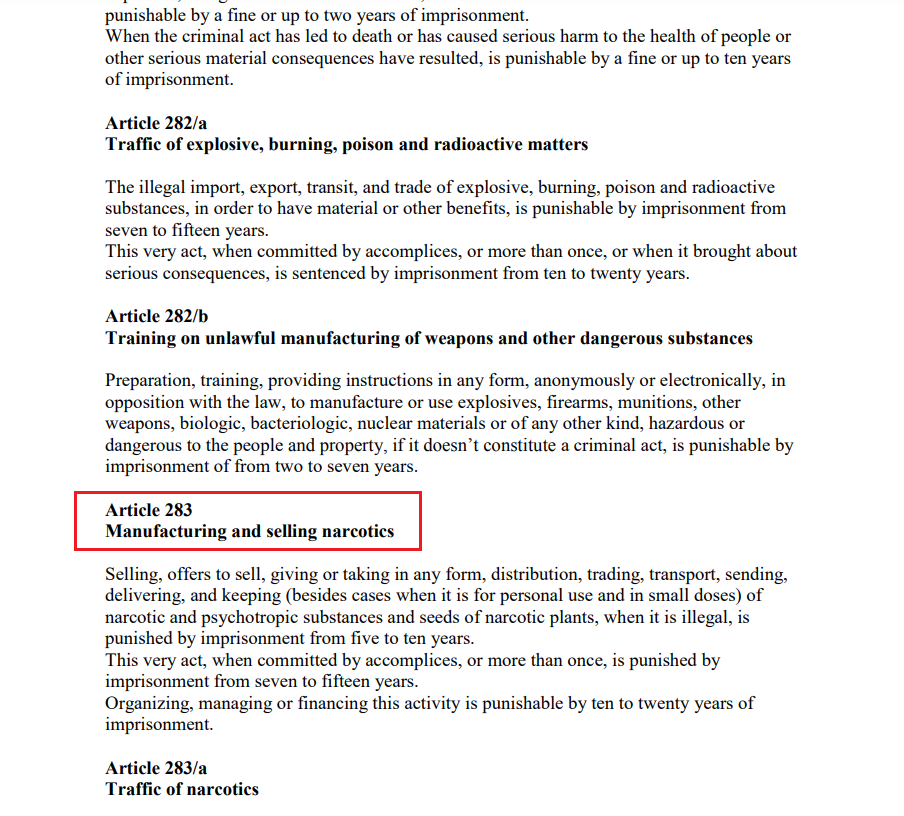
Pic. 3: Manufacturing and distribution of narcotics are prohibited in Albania and punishable by imprisonment from five to ten years.
Is Marijuana Legal In Albania?
Marijuana is illegal in Albania for recreational and medical purposes.
Cannabis is a Schedule I substance in Albania, despite the country being one of the biggest illicit producers of marijuana in Eastern Europe and worldwide.
The country has decriminalized possession of negligible amounts of marijuana for personal use. The amount is case-by-case as there’s no specific amount that exempts one from criminal charges (27th March 2008 Ruling of the High Court).
The law is strict regarding the manufacturing, possession, transport, and distribution of cannabis — these are punishable by imprisonment of five to ten years under Article 283 of the Albanian Criminal Code.
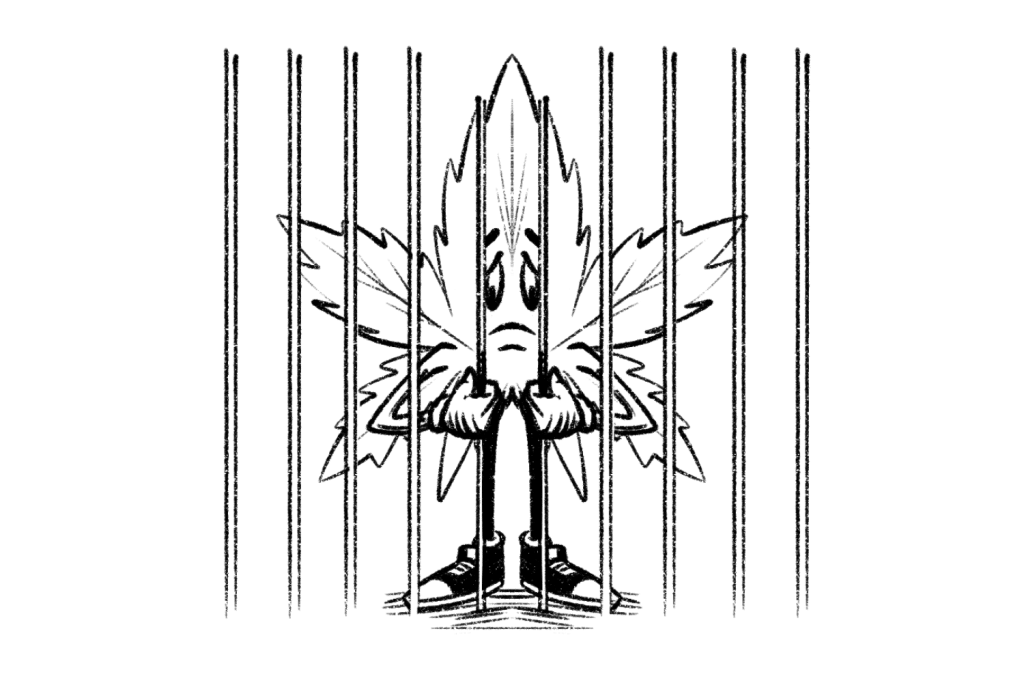
Marijuana is illegal for medical purposes in Albania, but the country is striving to join the European Union and is under pressure to pass a better anti-drug strategy. In April 2022, Albanian citizens supported medical cannabis, and a draft law was presented, but it faced scrutiny because its main premise was about production for export.
Tetrahydrocannabinol (THC) isomers like delta 8 THC and delta 10 THC are illegal in this country.
Hemp cultivation is illegal — Albanian law doesn’t distinguish between hemp and marijuana. The production of an illicit plant is punishable by imprisonment between three and seven years (Criminal Code, Article 284).
What’s the Difference Between Legalization & Decriminalization?
The main difference between legalization and decriminalization is that possession and use don’t bring severe punishment to the offender when a drug is decriminalized. Use and possession are unlawful activities, but the penalty is less severe.
Even though the punishment is decreased, the person still has to buy the substance from an illegal source.
If a substance is legalized, all punishment is removed; instead, there are laws surrounding how it’s manufactured, sold, and used.
Key Takeaways: What’s the Future of Psychedelics In Albania?
The situation with psychedelics in Albania is complicated. The country has a history of illicit drug trafficking and production, but on the other hand, it strictly punishes the distribution of controlled substances.
It’s too early to talk about the legalization of psychedelics in Albania. Cannabis remains illegal for medicinal purposes, so drugs like MDMA and LSD are not getting legalized anytime soon — even for medical uses.

